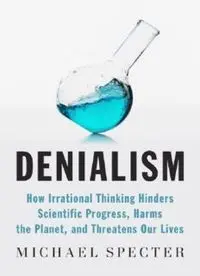
Denialism: How Irrational Thinking Hinders Scientific Progress, Harms the Planet, and Threatens Our Lives PDF
Preview Denialism: How Irrational Thinking Hinders Scientific Progress, Harms the Planet, and Threatens Our Lives
001 Table of Contents Title Page Copyright Page Dedication Introduction Chapter 1 - Vioxx and the Fear of Science Chapter 2 - Vaccines and the Great Denial Chapter 3 - The Organic Fetish Chapter 4 - The Era of Echinacea Chapter 5 - Race and the Language of Life Chapter 6 - Surfing the Exponential Acknowledgements NOTES BIBLIOGRAPHY INDEX ABOUT THE AUTHOR THE PENGUIN PRESS Published by the Penguin Group Penguin Group (USA) Inc., 375 Hudson Street, New York, New York 10014, U.S.A. Penguin Group (Canada), 90 Eglinton Avenue East, Suite 700, Toronto, Ontario, Canada M4P 2Y3 (a division of Pearson Penguin Canada Inc.) • Penguin Books Ltd, 80 Strand, London WC2R 0RL, England • Penguin Ireland, 25 St. Stephen’s Green, Dublin 2, Ireland (a division of Penguin Books Ltd) • Penguin Books Australia Ltd, 250 Camberwell Road, Camberwell, Victoria 3124, Australia (a division of Pearson Australia Group Pty Ltd) • Penguin Books India Pvt Ltd, 11 Community Centre, Panchsheel Park, New Delhi - 110 017, India • Penguin Group (NZ), 67 Apollo Drive, Rosedale, North Shore 0632, New Zealand (a division of Pearson New Zealand Ltd) Penguin Books (South Africa) (Pty) Ltd, 24 Sturdee Avenue, Rosebank, Johannesburg 2196, South Africa Penguin Books Ltd, Registered Offices: 80 Strand, London WC2R 0RL, England First published in 2009 by The Penguin Press, a member of Penguin Group (USA) Inc. Copyright © Michael Specter, 2009 All rights reserved LIBRARY OF CONGRESS CATALOGING-IN-PUBLICATION DATA Specter, Michael. Denialism : how irrational thinking hinders scientific progress, harms the planet, and threatens our lives / Michael Specter. p. cm. Includes bibliographical references and index. eISBN : 978-1-101-15102-0 1. Science—Social aspects. 2. Research--Forecasting. 3. Belief and doubt. 4. Science—Philosophy. I. Title. Q175.5.S697 2010 306.4’5—dc22 2009028489 Without limiting the rights under copyright reserved above, no part of this publication may be reproduced, stored in or introduced into a retrieval system, or transmitted, in any form or by any means (electronic, mechanical, photocopying, recording or otherwise), without the prior written permission of both the copyright owner and the above publisher of this book. The scanning, uploading, and distribution of this book via the Internet or via any other means without the permission of the publisher is illegal and punishable by law. Please purchase only authorized electronic editions and do not participate in or encourage electronic piracy of copyrightable materials. Your support of the author’s rights is appreciated. While the author has made every effort to provide accurate telephone numbers and Internet addresses at the time of publication, neither the publisher nor the author assumes any responsibility for errors, or for changes that occur after publication. Further, publisher does not have any control over and does not assume any responsibility for author or third-party Web sites or their content. http://us.penguingroup.com To Emma, who all by herself is reason enough to reject denialism. INTRODUCTION Ten years ago, while walking through Harvard Yard, I saw a student wearing a button that said “Progressives against Scientism.” I had no idea what that meant, so I asked him. Sci entism, he explained, is the misguided belief that scientists can solve problems that nature can’t. He reeled off a series of technologies that demonstrated the destructiveness of what he called the “scientific method approach” to life: genetically modified foods, dams, nuclear power plants, and pharmaceuticals all made the list. We talked for a few minutes, then I thanked him and walked away. I didn’t understand how science might be responsible for the many scars humanity has inflicted upon the world, but students have odd intellectual infatuations, and I let it slip from my mind. Over the next few years, while traveling in America and abroad, I kept running into different versions of that student, people who were convinced that, largely in the name of science, we had trespassed on nature’s ground. The issues varied, but not the underlying philosophy. Society had somehow forgotten what was authentic and there was only one effective antidote: embrace a simpler, more “natural” way of life. No phenomenon has illustrated those goals more clearly than persistent opposition to genetically engineered food. “This whole world view that genetically modified food is there so we have no choice but to use it is absolutely terrifying and it is wrong,” Lord Peter Melchett, a former British Labour minister, told me when I met him a few years ago. Today, Lord Melchett, whose great-grandfather founded one of the world’s largest chemical companies, is policy director of the British Soil Association, the organic food and farming organization. The first time we spoke, however, he served as executive director of Greenpeace, where he was in the midst of leading a furious campaign against Monsanto (which he referred to as “Monsatan”) to rid the world of genetically engineered foods. “There is a fundamental question here,” he said. “Is progress really just about marching forward? We say no. We say it is time to stop assuming that discoveries only move us forward. The war against nature has to end. And we are going to stop it.” I felt then—as I do now—that he had gotten it exactly wrong; scientists weren’t waging a war at all, he was—against science itself. Still, I saw Lord Melchett as a quaint aristocrat who found an interesting way to shrug off his
